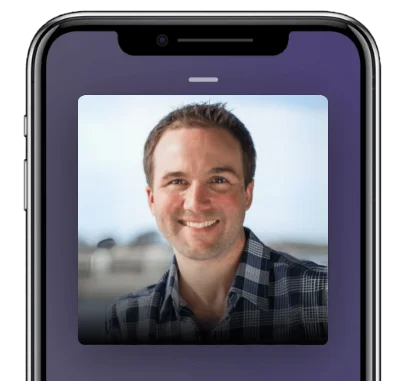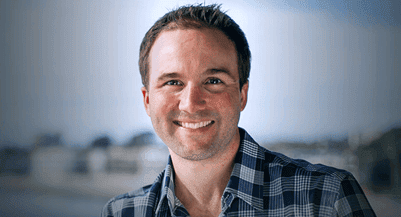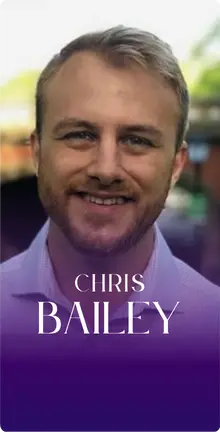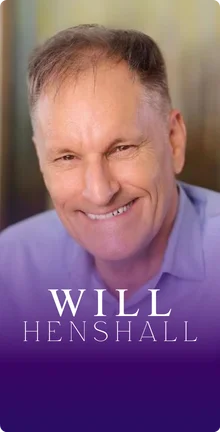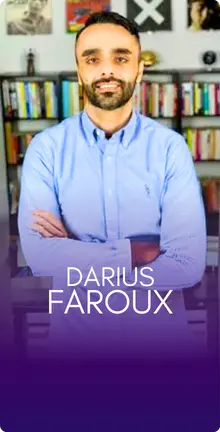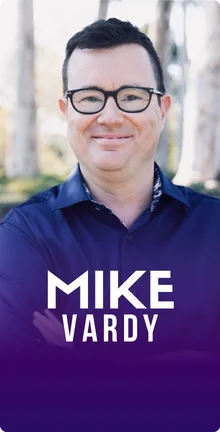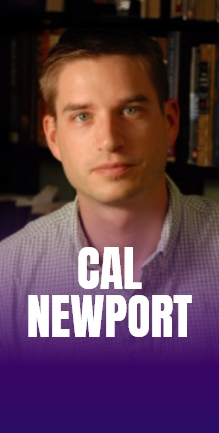In this Episode
- [01:26]What are the keys to mastery? There are three, John explains: productivity, discipline, and focus.
- [02:21]John talks about how he decided to create The Mastery Journal.
- [03:43]The morning routine is key, John reveals, and explains how best to take advantage of this concept.
- [05:43]Does John use Focus at Will to help him focus? It turns out both he and Stephan have interviewed the founder, Will Henshall.
- [06:56]John doesn’t have multiple affirmations, but rather one affirmation per day. His affirmation for today is gratitude for his new essential oils machine.
- [08:14]We learn more about the four daily sessions in the Mastery Journal. John uses 42 minutes of focus followed by 18 minutes of refreshing, but he emphasizes the importance of finding numbers that work for you.
- [10:48]John talks about the daily self-evaluations in the Mastery Journal.
- [11:58]The 10-day recaps are important because they help you evaluate your flow and answer the hard questions.
- [12:54]What are some of John’s favorite productivity tools?
- [13:37]John talks about his to-do lists, for which he particularly prefers WorkFlowy. He then talks about his favorite productivity gurus and books.
- [15:31]John shares his advice on making the most of podcasts.
- [17:12]What are John’s techniques for building and maintaining relationships? After answering, he gives his advice on how to make sure your podcast guests share your podcast once it’s live.
- [21:03]John shifts into talking about becoming a speaker.
- [23:46]We hear some of John’s advice for new speakers who don’t yet have a long or solid track record.
- [25:51]John shares his thoughts on how to do best on YouTube. He suggests, for example, not putting sound-only podcasts on YouTube, because people go there for videos.
- [27:16]With so much to do every day (or every week), why does John choose to do a daily podcast show?
- [29:03]Building an audience takes free, valuable, and consistent content.
- [31:17]Did John hire a company that specializes in Kickstarter videos for his?
- [31:59]In response to Stephan’s question about traditional publishers versus self-publishing, John acknowledges that he isn’t an expert in the subject. Personally, though, he’s happy with his self-publishing decision.
- [33:20]What’s in John’s warehouse, aside from the 20,000 copies of his book?
- [34:18]John offers some tools and recommendations for new podcasters.
- [34:54]Why does John live in Puerto Rico?
Thanks for joining us today, John.
How are you doing today?
I’m doing great. Let’s jump right in. You just came out with The Mastery Journal. What are the keys to mastery?
The key to mastering the three keys and skills within The Mastery Journal are productivity, discipline, and focus. For me, mastering and perfecting are completely different processes. That’s a lot of the issues that people have. They’re scared of trying to perfect and perfect. The fact is you try to master something, it’s a lifelong passion, it’s a lifelong thing to master. For me, the key to mastery is to wake up every single morning and to be a little bit better by the end of that day than you were that morning. That’s the process of mastering then you will get to that point of mastery. The mastery journal is all about the three scales of productivity, of discipline, of focus.

Got it. How did you come about putting together this mastery journal? There are a lot of productivity books out there, a lot of planners, journals, and so forth, online tools, what niche did you see that needed to be filled?
I think what we need to do as entrepreneurs is look within and say, “What am I strong at? What am I good at? Where are my strengths?” Because I’ll tell you, Stephan, if I was going to be creating a book on my weaknesses, it would be a thousand pages long but I instead decided to create a book on my few but mighty strengths. I’m strong when it comes to being productive day-to-day. I’m strong when it comes to being disciplined and I’m strong when it comes to focusing. Those are my three strengths. I knew that there was not a book, there was not a journal, there was not a guide out there that was going to focus 100% on having others master those 3 skills in 100 days. If people want to know how me, JLD, grew EO Fire into a seven-figure a year business into having all the success that I have attained with all the failures that I was able to survive as well, then they will want to know what it means to be productive, disciplined, and focused on a day to day basis. That’s what The Mastery Journal does, it takes you there in 100 days.
Let’s walk through some of the aspects of mastery and what goes into The Mastery Journal. You have the morning routine, you have affirmations, you have the 10-day recap. Let’s kind of break this down. First of all, the morning routine. What’s your morning routine and what do you recommend for folks?
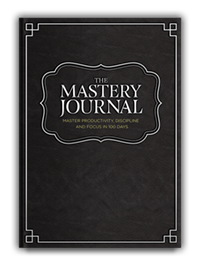
The morning routine is key and one of the aspects of The Mastery Journal that I really like to point people’s attention to is you end every single day with a section that’s called Win Tomorrow Today. What does that mean? That means that you win tomorrow today by writing down tomorrow’s morning routine tonight before you go to bed. That way when you wake up and you’re tired, and you’re groggy, and you’re stumbling around not really sure exactly what you’re going to do, you can try to use the four brain cells that have woken up to figure something out. No, there’s none of that. You are going to crush your morning routine. For me, that morning routine, I’ll say what it is today because it does change from time to time because I have different things going on. Maybe it’s these interviews, maybe it’s this, maybe it’s that. My morning routine today was to wake up and be on my rolling machine by 6:00 am. That was my goal last night and guess what? My actual time on being on the rolling machine was [6:15]. I kind of failed there. I had to be honest on my mastery journal and write down my actual starting time.
I crush the rolling machine for 2,000 meters then I jumped up and maxed out on pull-ups and that was my little 15-minute, getting the blood flowing, getting a little bit of sweat, a little exercise in the morning, a little wake-up time then shower, shave, sit down in my office for seven minutes meditation. I use this great app and tool called Muse to meditate and then it was followed by a 15-minute journaling session within The Mastery Journal. After journaling, then I turned and I saw that I had about an hour before my first interview so I wanted to try to get to in Inbox Zero. Typically, I wait to get to Inbox Zero till later in the day but because my day today was back to back interviews, I wanted to crush and get any important emails out that it happened overnight. I sat down for about 30 minutes, got to Inbox Zero, did some social media stuff, then I started my interviews and haven’t stopped since. Every day is different but the important thing is that I know what my morning routine is the minute that I wake up and I execute upon that.
Okay, do you use Focus@Will to help you in focusing as well?
It’s interesting that you bring that up. I’ve actually interviewed the founder, Will.
So have I.
He’s a great dude.
He is.
Love him. I use it. Just for people that are listening, they’re like, “What’s Focus@Will?” It’s a great app. It can be free. I actually use the paid version because I love it that much. It’s where you can put any number of musical tracks on, I love classical, cinematic, and acoustic. Those are my three favorites. It’s just music playing in the background that’s meant to not to distract you but to help you with your focus. Absolutely, Focus@Will is playing 100% of the time when I’m not on interviews, etc.
Interesting. Do you follow Elrod’s morning routine approach?
Hal is a very close friend. Love that guy to death but no, SAVERS does not work for me. It works for thousands and thousands of people and I think it’s great but I follow my own system.
I’ve had Hal on the show as well. He’s great.
Amazing.
Let’s talk about affirmations. What do you do for your affirmations? How often do you write them? Do you speak them, do you change them very frequently?
For me, it’s singular. I believe in creating one affirmation per day and that is your daily affirmation. Within The Mastery Journal, a part of that is right at the beginning to say something that you are grateful for. Whatever that thing is, that is my daily affirmation. I always try to mix things up. I’ll go back to the well, “Oh, I’m thankful for my family.” We got it, we get it, we’re all thankful for our family. Let’s try to change things up, let’s try to dig deep, let’s try to really go into some unchartered territory here. I think that’s very helpful. I really try that to change things up. Again, I go back to the well sometimes but I try to have at least 60 or 70 different affirmations over my 100 days of mastery.
Would you be willing to share your affirmation for today?
My affirmation for today was actually pretty funny because I actually in Amazon got this essential oils machine that you can pour essential oils into this fogger that will then blow essential oils into the air and I turn it on and I was just like, “Ahhh, I’m thankful for my essential oils machine today.”
That’s awesome. Cool. You have four daily sessions that you include in The Mastery Journal. Are these Pomodoro’s? Are you following the Pomodoro Technique? How long are these sessions and why four?
I think people should trial and error it for themselves.
It’s heavily influenced by the Pomodoro Technique but the Pomodoro technique is at its root 25 minutes of focus and then 10 minutes of rest, essentially. That just didn’t work for me. It was too short of a time, I felt like I was just hitting my stride around the 20- to 25-minute point. I wanted to leave it more open-ended for people while still using all the benefits of what is a Pomodoro Technique. I leave the two sessions, which I termed Focus session and Refresh Session, open. Again, I think people should trial and error it for themselves. Again, I started it at 60 because I thought 25 was too little and 60 was way too much. I just kept going back and forth till I got to my perfect time which again, can change in the future but right now, it’s 42 minutes of focus with 18 minutes of refresh. I like it because it feels less than 45 and I feel like those 18 minutes sound a lot bigger than 15 because a lot of people are like, “Why don’t you just go 45 and 15?” and I’m like, “Well, that’s why.” I like how it’s still around an hour.
I do two focus sessions in the morning followed with the refresh sessions and then in the afternoon, I aim for two more as well. The reason why I chose four as a total is because I beta tested this, not just with myself but with other people. I would find that six was just too daunting. That’s where I started and people were getting to like two or three and still feeling like they had three more of these sessions. It was just too much. The thing is, this is 100 days. This isn’t a marathon, this isn’t a sprint. If you really want to go for a fifth focus session, I’m not going to stop you. You don’t need The Mastery Journal to go for a fifth session, go for it. You have my blessing but I just liked the four. It just made sense for me, the two in the morning, the two in the afternoon or however it works for you and your schedule. The key part is don’t short yourself with the refresh sessions. Those are key as well.
You can also extend the length of those focus sessions by using Focus@Will so you don’t have to take a break after 25 minutes which is kind of when the brain starts to get tired if you aren’t in a focus state with some streamline music in the background.
Maybe that’s why I thought the 25 minutes is too short. I was using Focus@Will. I’m like, “Hey, I’m still ready to go!”
Yeah, probably. Daily self-evaluation is part of the process that makes The Mastery Journal work. I’m unclear, how do you score yourself and do you get people that push back against that? Like saying, “I don’t want to score how good I am at these things because it just brings me down if I’m scoring myself low.
You’re going to win as an entrepreneur if you learn how to self-evaluate yourself.
People are going to push back over everything. You just have to deal with that as an entrepreneur and as a creator. But the reality is this, nobody is going to be standing over your shoulder 24/7. You need to learn and embrace self-evaluation. You’re going to win as an entrepreneur if you learn how to self-evaluate yourself. You’re going to lose as an entrepreneur if you fail in those things or if you don’t learn those skills. Within the beginning parts of The Mastery Journal, I do take you through a guide and coach on how to self-evaluate yourself. But the key takeaway is you can’t overthink it for the first week to two weeks because you don’t have a baseline yet. The first couple of weeks are going to be where you create your baseline about what it means and what it feels like to be productive, and to be disciplined, and to give yourself some scores and just start to say, “Okay, this really was productive compared to what I’m used to.” Maybe that’s going to be a seven because of course, there’s more than five which would be an average session. You just start over a couple of weeks to have your own internal, mental, baseline that you can work with. It’s something that you just can’t overthink, you just go to start, you got to follow the process, you gotta trust in the process and just grow from there.
Awesome. What’s the 10-day recap?
The 10-day recap is important because a lot of people just put their heads down and just charge forward. But guess what? There can be leaks in the boat. There could be some things that are wrong that if you can just tighten that screw, pivot, or twist even just a little bit, I’m talking 1% to 5%, it doesn’t have to be much, it can make a big impact in the overall 100 days. The 10-day recaps are meant for you to number one, get a good vibe about what your 10-day score is because as you see when you go to the 10-day recap that you’ve been filling at a bar chart the entire way through, you can kind of see what’s your flow’s been. I really ask you the hard questions. What have you been successful with? Let’s be really real about this. But at the same time, what have you struggled with and what are some possible solutions to these struggles so that going forward, you’re aware, you’re cognizant of it and maybe those solutions that you’ve come up with can come into play and really help you in going forward.
Awesome. What are some of your favorite tools for productivity beyond the course of The Mastery Journal?
I’m a big fan of Parkinson’s Law and that’s just a simple phrase that tasks will expand to the time allotted. That’s why the Pomodoro method works, that’s why actually having a time boundness of the 100 days works. Also, pray those principles. I think it’s really important that we realize that 20% of what we do is going to result in 80% of our overall desired outcome. We need to realize, “What is our 20% and why don’t I just amplify and focus on that and just get rid of all the fluff in my life or at least just not put so much emphasis on that?” Those are a few things are really big as people move forward, I think they’ll find beneficial.
20% of what we do is going to result in 80% of our overall desired outcome.
Where does the to-do list come in? Do you have a to-do list? Do you use a tool or app?
I use WorkFlowy which I love. It’s great because the search feature is amazing. I can search for anything in a second and it pops right up. I love how they have the bullet points that I can drag and drop and the complete, where they just strikethrough etc. I’m using WorkFlowy, the page feature for about four years now and honestly if you could say, “John, if there’s one thing that does not disappear tomorrow but everything else does for your business,” I would probably be like, “I need my WorkFlowy.”
Gotcha. Favorite productivity gurus or books that you want to mention?
We’ve always talked about Hal Elrod. He’s amazing with The Miracle Morning. I recommend that all the way. Some things that have really been beneficial for me is Deep Work by Cal Newport. I think it’s really important for us to recognize that residue is real. Meaning that, yeah you want to just check your inbox really quick to see if any important email came in but that one bad mail that you just kind of got a glimpse of, that’s going to have some residue and move forward with you into whatever that next task is. You just can’t do that to yourself that’s why you’ve got to completely block things out and focus. There’s a great tool that I use called Self Control that blocks out these type of things and doesn’t allow you to even go to that little quick peek that ends up being a disaster.
This topic of podcasting being a profit center, not just a cost center because I think most people struggle with this idea of turning podcasting into a profitable activity. They’re just using it as a way to get their brand out there or just to get some leads in the door but they haven’t monetized this successfully. You have, you’re generating $250,000 a month I revenue and [00:15:19]. You didn’t just start out that way. How does somebody get from where they are at the very beginning levels, maybe no monetization to $250,000 and more a month?
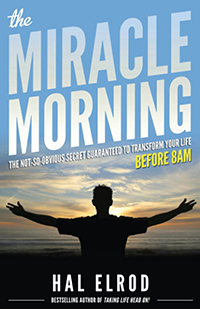
The key phrase that I really want to make sure that people absorb and listen to is relationships are everything. When I launched EOFire, I had zero relationships. I had zero experience in the online world. I had no connections. I had nothing but I had to start somewhere so I did just start. Podcasting is an amazing medium to connect, to build relationships. I have now over 1,200 conversations with successful entrepreneurs in the past three and a half years. That is a ton of relationship building, of connections, of really just making things happen. Stephan, you and I met at a conference, in Content Marketing World. It might have ended there but now we’re having another conversation, months later, on this podcast, building our relationship. This is a great example of how podcasting is a phenomenal medium that can allow you to first grow, cultivate, and leverage relationships in a mutually beneficial manner.
What are some of the relationships that we need to cultivate? For example, I might a use a resource or a person to help me get on the other shows so there’s [00:16:40], there’s interviewconnections.com and so forth. There are different pathways to get on other podcaster’s radar. There are marketing experts that I want to have on my show who are not into podcasting per se but they’d be great to have on my show so I want to develop relationships there. There are other subject matter experts and so forth. What are some of your key techniques for building and maintaining relationships? Are you using CRM tools? Are you getting people on an email list? What are you doing?
Really, a great tactic for anybody that’s looking to get going in this industry is to know that within your industry, there are a ton of great conferences, tradeshows. You name it, they’re happening right now all over the world. A great example for us again, is to come back to Content Marketing World. That was a great conference with a ton of entrepreneurs. What do those entrepreneurs do? They present it from stage. What do those entrepreneurs have? Credibility, authority, a voice, a message to share with an audience so you better believe if they’re going to travel to Cleveland, Ohio. If they’re going to travel Cleveland, Ohio to speak for 45 minutes in stage, you better believe that they’re going to do a 25- to 30-minute interview from the comfort of their own home over Skype. It’s just a no brainer for so any different ways, shapes, and forms. Go to those pages. They have your conference, tradeshows, and go to the speaker’s app. See the hundreds of people that are there. The smaller conferences, maybe there’s 10. The medium size, maybe there’s 50. The big ones, there’ll be hundreds. Reach out to them. Click on that and it’ll take you their home page or just Google their name. They’ll come up, go to their content, and say, “Hey, I’d love to have you on my show.” Then, you start with waterfall effects. You can start that tipping point where now, you’re going to start having people who are recommending guests to be on your show because they’re a past guest and they’re getting great feedback from it. It starts with you getting out there and doing the outbounds. At this point now with my podcast, I get 50 inbound requests per week of people wanting to be on the show. You will reset [00:18:44], it’s just a matter of you getting out there and getting that initial momentum.
A great tactic for anybody that’s looking to get going in this industry is to know that within your industry, there are a ton of great conferences, trade shows. Share on XPart of getting these guests onto the show, part of the maybe, unspoken expectation is that they’re going to promote to their audience that episode, that interview. Sometimes, that is not explicit, that’s not laid out unless they don’t do any promotion and they’re not helping themselves. In the Jerry Maguire movie, he says, “Help me to help you.” These people aren’t doing it. Maybe, some tips around making things more explicit as far the guest obligations?
Here’s the novel idea. How about after you just talked to somebody for 25, 35 minutes, develop rapport a relationship when you’re having your post-interview chat and you say, “Hey, by the way when this interview goes live, I want to reach out to you via email. I’ll let you know with all the links. I would really love if you would share this with your audience. You think that’s something you’d be willing to do?” Just put it out there. Make the ask. Voice the voice with somebody you just built a relationship with. Then, when the interview goes live, give a shout out to the email and say, “Hey, by the way, Stephan, I really appreciate you agreeing to share this when it went live. It’s going live. Here are all the links for you to share easily. Thanks again for sharing. I really appreciate it.” You better believe they’re going to share. It’s just going to happen because they’ve committed to you verbally and now, you remind them of that commitment. They’re going to take action. That’s just how entrepreneurs and people with integrity works. If you structure it in that manner, it works.
For sure. We talked about getting on the radar of speakers at a show such as Content Marketing or by the way, it’s funny you also mentioned Content Marketing World because I just had [00:20:23] on my show.
Love Joe.
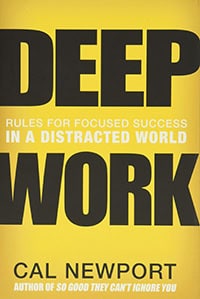
He is awesome. It’s a great episode. Let’s say that you have some rapport building going on with speakers. What about becoming a speaker yourself? It gives credibility. It gives you a platform and you can then leverage that perhaps, get a gig as a columnist somewhere such as entrepreneur.com, or you could maybe even get a publisher for a book that you’ve been wanting to write. Being on a platform as a speaker is a great jumping-off point for further things in your career. Any tips on becoming a speaker?
An amazing segway by you, Stephan. Probably even inadvertently but [00:21:10], phenomenal example. That guy is the creator and founder and person who makes decisions at a massive conference. Guess what, you have him on your show. You make a good impression. You build up a rapport. You let him know, “Hey Joe, by the way, I know the next conference is about 10 months away but I’d love to add value in any ways you perform. If you are looking for a presenter in a certain area, this is what I can provide. I’d love to make it happen. Just plant that seed.” Follow up, reach out. You’ve already built that connection with him. Before you know it, you’re going to start getting offers to speak at conferences. Once you get one conference under your belt, that’s on your resume. “Hey, I spoke in a Content Marketing World, Social Media Marketing World. Podcast Movement, Icon. You name it.” That is how you go from strength to strength by building a relationship.
Absolutely. Speaking of Content Marketing World and how they do it, your primary consideration when you have spoken before for them and you’ve done a good job but there’s a speaker form that you have to submit in order to be in the consideration set for next year. They had a window thereof like a month or two where you could pitch. Even if you’re a returning speaker, you still have to pitch. I pitched, I got in. I just heard this week that I’m going to be speaking again at Content Marketing World. This will be my third year in a row.
Congratulations, Stephan.
Thank you. They take this very seriously. They say four plus speakers only. If you have not achieved a four out of five minimum in your speaking scores, you are not invited back.
Wow. Do you know how many people don’t achieve fours?
I don’t know, but that’s pretty serious. I was breathing a [00:22:56] when I got in again. There are calls for speakers that we should be putting out our fillers for or at least just doing Google searches on. You can just do this if any of our listeners here in front of a computer or on your mobile phone, just put in quotes call for speakers in the industry. Let’s say you want to speak at a TEDx, put in call for speakers in quotes, and then TEDx. See what kind of calls for speaker you can find for the TEDx conference. Even if you have to travel for a TEDx, do it so that you get TEDx and that logo on your resume, on your website.
Heck, yeah.
What sort of conferences, what workshops, Masterminds, and things like that would you recommend for a new speaker? Somebody who doesn’t have a big track record.
The reality is you can make it happen if you’re hearing our voice right now.
I think you have a great idea with the whole TEDx thing because a lot of people are like, “Oh, Ted Talks. Those are like Netflix. They’re huge and they’re massive.” They are but a lot of you don’t know that TEDx, those are just little satellite things. A lot of times, they’re really semi desperate looking for speaker but if you have that TEDx perception is reality and boom, you’re a TEDx speaker. I have been asked to speak at TEDx a ton of times. It just hasn’t happened for me yet. The reality is you can make it happen if you’re hearing our voice right now. You can speak at a TEDx Conference, no doubt. Do things like that. Speak locally. Hire a videographer from Craigslist or from anywhere just locally. They’ll come and record you. I don’t care if there are four people in the audience. You just have him record you up on hopefully, some kind of stage with some kind of microphone, talking, and then you can create a little bumper video of you with music underplayed, talking different angles. Put on a couple of different outfits. Have a couple of outfit changes. Do what you got to do to make that happen so that your perception when you’re reaching out and saying, “Hey, here’s my speaker clip.” They’re going to be like, “Oh, this guy is legit. He won’t embarrass me at the conference.” Make it happen.
Let’s talk about videos and particularly YouTube because that’s the number two search engine. It gets more search queries than Yahoo or Bing and yet it’s often ignored by entrepreneurs, by business owners. That’s a big mistake, I think. In order to rank in the number two search engine, YouTube, you need to have a channel. You need to have videos and those videos need to be valuable. There needs to be great textual content to augment video in the title, in the description, and so forth. For podcasters specifically and then just generally for an entrepreneur, what would you recommend the strategy be for YouTube? If I’m a podcaster doing an audio-only podcast, do I just stick that up on YouTube? It doesn’t seem to really take off if you do that. You do something different. What about general people?
I think you’d be wasting your time to repurpose your audio-only content in the YouTube because people are going to YouTube to watch videos and to make that happen. You’re just going to have some extra effort with very little return or result. I am speaking from experience because I did this for months and months and months. [00:26:10]. I don’t recommend that. I really recommend focusing on whatever channel you are focused on. I’m focused on audio-only so I’m an iTunes, I’m [00:26:20], SoundCloud, Spotify, Pandora, iHeartRadio. That’s where I focus my time, energy, and effort. That’s where I really suggest people focus theirs as well. Find the movers and the shakers in your industry. Those directory that really have the audience that you’re looking for. Just focus on those.
You’ve chosen to do a seven-day-a-week show which seems like a heck of a lot of work. I do a once-a-week show. Actually, I have two shows so that’s…
Stephan, are you scared of hard work?
Yeah, right, totally.
I don’t think so.
I guess when I look at the different things I could be doing, I could be a guest to other people’s shows. I could be pitching for speaking gigs. I could be putting together marketing strategies for my clients and working on SEO consulting gigs and so forth. There are so many things to do. It seems really daunting to take on seven day a week show or even a five day a week show. What’s the reasoning for that? Why would you do it?
With no experience, with no online presence, I had to build as many meaningful relationships as quickly as possible, that was going to leverage my success.
Back to relationships. Because I knew that with no experience, with no online presence, I had to build as many meaningful relationships as quickly as possible, that was going to leverage my success. I could have done a weekly show and talk to four entrepreneurs a month or I could have done a daily show and talk to 30 entrepreneurs per month. I chose the latter and here I am, 1,200 episodes later, 1,200 relationships later, 1,200 days later, really making a dent in this universe. For me, it was just all about what am I really focused on doing. That’s number one, delivering your free, valuable, consistent podcast to a listener base. Number two, building a lot of relationships. To do that, daily was my answer. It’s not for everybody and it shouldn’t be. Consistency should be a focus. It doesn’t have to be daily but I really do want to just underline the importance of, “Hey, you need to focus on what is going to be really that big domino, that if you knock it over, that chain reaction of awesome will happen. For me, it was that daily podcast. I focused everything on that.
That was a great differentiator for you too.
Huge.
Who does that, right?
Still is.
That’s awesome. You were able to piggyback on that and turn that fan-based. Kevin Kelly calls it 1,000 True Fans. I’m sure you have a much larger number than 1,000 but these rabid fans who are just clamoring for the next thing that you offer. That was your jumping-off pad for being able to provide information products in a community that people pay for on a monthly basis in order to participate in. Could you share a little bit about your experience with that? Why you priced it the way you did? You had it recurring in the way that you did and structured the way you did.
The biggest thing for me when entrepreneurs are fired [00:29:10] while saying, “Hey, how can I continue delivering free, valuable, and consistent content that will, as a result, grow an audience?” To me, again, it was those three ingredients, it was finding that way to make sure that it was free, valuable, and consistent. Then, what happened, Stephan? I built an audience because I was doing those three things. What did I do? I engaged with that audience and I said, “Hey, what are you struggling with?” They told me their pain points, their obstacles, their challenges and then I, the host that they know they can trust, of a podcast they listen to, created the solution in the form of a product to serve a community. A lot of people are saying, “John, how do I create, grow, and monetize my own podcast?” I launched Podcasters’ Paradise which has grown into the number one podcast in community in the world. Over 2,800 members, over $3.5 million in revenue, all from that focus. Webinar on Fire, people wanted to learn how to do webinar so I taught them how to do that through that community. Then my most recent passion project, The Freedom Journal came from people saying, “Hey, what’s the secret to success of all of your guests?” I said, “Well, they all know how to set an accomplished goal. You are struggling with that. How about I create the solution in the form of this beautiful leather-bound journal that teaches and guides you how to accomplish your number one goal in 100 days.” It all starts with that engagements.

This leather-bound journal, is that something that you’re offering on Amazon? Is this going to be through a traditional publisher or self publish? How does that work?
January 4th, I launched The Freedom Journal on Kickstarter. It’s a 33 day which we’re in the middle of right now. If you’re listening after February 5th, you visit thefreedomjournal.com, you’d be taken to an amazing page where you can purchase your own version of The Freedom Journal. It will also be available in Amazon.
Perfect. That is awesome. I love using Kickstarter as a way to either self publish a book or to launch a product or even just to test run to see if the product has market appeal. It’s just so powerful. The video is everything. Did you hire a specialized firm that does just Kickstarter videos to do this for you?
No, I actually hired a friend who’s here in San Diego that does a lot of video work, Caleb Wojcik. I’ve seen his work with my friends like Pat Flynn and other great entrepreneurs. I said, “That’s the guy that’s going to crush the Kickstarter video for me.” We had a blast doing it.
Awesome. What would you recommend for somebody who wants to become an author and they don’t know whether they should get a traditional publisher or if they want a traditional publisher, how to get an agent to make that happen or how to get introductions to potential agents or publishers? How to write the book proposal? There’s so much to just comment with the book. Or maybe they just self publish. What is your recommendation for folks?
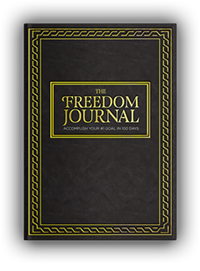
I believe in really being honest and transparent about where my expertise lies and this is not where it lies. I created The Freedom Journal on my own, self-published. I wanted nothing to do with traditional publishers and I wanted to really create it my way. That’s what I did. I created The Freedom Journal with 100% my focus, my effort, my energy. Bringing my team together, I went and had 20,000 copies printed on my dime, shipped to my warehouse to be ready for distribution. That’s what I wanted to do. That was the route that I wanted to take. I don’t really know much at all about the traditional route. I know some people who have had success. I know a lot of people who have been very unhappy with that route. I just knew that I wanted to be stirring my own ship with this. I’ve been very happy with my self-publishing decision. It’s something that I really think Kickstarter has been a great opportunity for me to leverage, just took huge audience there in the transparency of people being able to see how many backers I have and how much money has been raised just by going to thefreedomjournal.com and seeing that campaign page. It’s been a great experience for me but I think people should really reach out to other, probably like yourself Stephan, who knows a lot more than me about traditional publishing to get those answers.
Cool. You mentioned you have a warehouse. What’s in your warehouse besides all those books?
I maybe over spoke a little bit. It’s not my warehouse. What is it is it’s a warehouse through a company called Shipwire where I do rent a portion of that. I actually do have my own little section to house those 20,000 books within the warehouse. When I want to order, I can go through their website and order a book. Their handlers will actually ship it out. It’s a very hands-off process. Shipwire is the name of the company and I’m very happy with them.
Cool. We’re about out of time. I know you have to jump on your next interview. Just to wrap up, what would be the top one tool that you would recommend folks who are interested in exploring this podcasting world? I mentioned at the beginning of freepodcastcourse.com. In addition to that, any other favorite tools, resources that you’d recommend new podcasters?
One thing that I definitely realized is the wide array of choices and decisions you have to make when you’re starting your first podcast. There’s a great company that I actually helped co-found. I’m a big part of this as well called podcastwebsites.com. This is a company that is your all in one solution. If you are just saying, “Hey, I want to podcast and I don’t want to have to deal with all these different moving parts. It is your website, your audio hosting, your support, your back up, your security, all in one. You can learn more about that at podcastwebsites.com.
Yup. Last question, why do you live in Puerto Rico?
I live in Puerto Rico because I am both financially and location independent. Why not get adventurous? Why not go try and live somewhere that’s fun, that’s in the sun, that’s a different culture, different vibe, and all of these things. Plus there’s an amazing economic stimulus package for entrepreneurs called Act 20 and because of that, I pay a flat 4% corporate tax rate, no federal, no state, 4%.
Amazing.
Game-changer!
Thank you so much. It was great having you on and I know you got to go onto your next interview.
Thank you so much! It was a blast.
Listeners, if you could also visit eofire.com. If you’re interested in taking your podcasting to the next level, podcastersparadise.com which is that podcasting community that John runs. Thank you again, John. This is amazing content. I hope that it expands folk’s horizons and gets them thinking differently. Listeners, we’ll catch you on the next episode. I’m your host, Stephan Spencer. Catch you next time.
Important Links
Connect with John Lee Dumas
Previous Entrepreneurs On Fire Podcast Episode
Tools/Apps
Organization
Books

